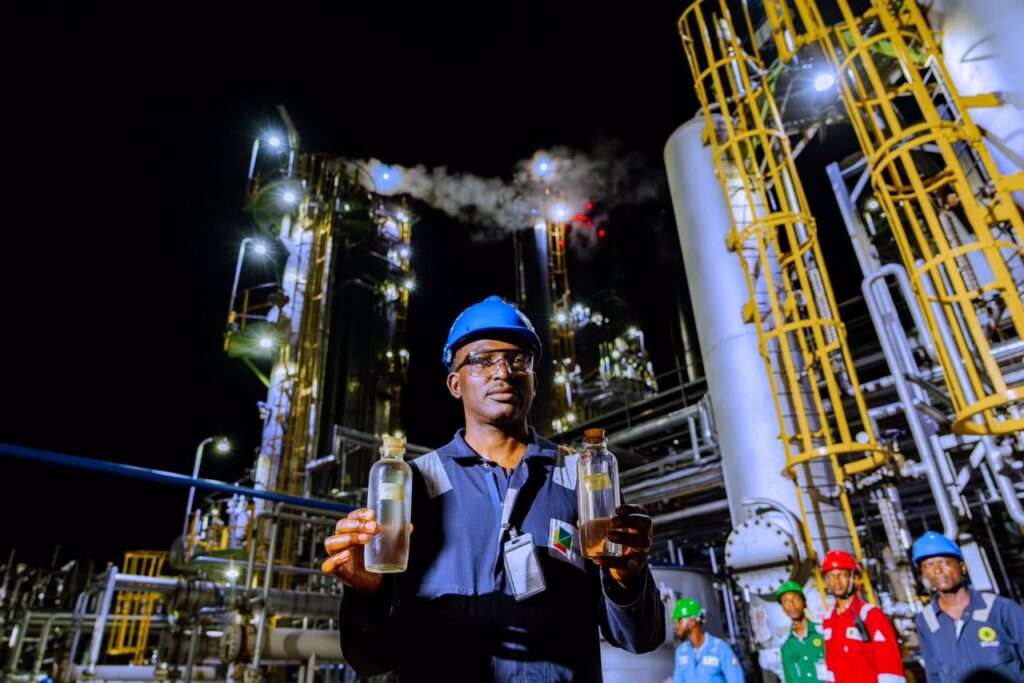The Nigerian government has announced an ambitious plan to increase the country’s crude oil production by 1 million barrels per day (bpd) by December 2026, raising total output from the current 1.75 million bpd to approximately 2.75 million bpd.
This effort, led by the Nigerian Upstream Petroleum Regulatory Commission (NUPRC), is part of broader strategies to revitalize Africa’s largest crude oil producer.
The initiative, dubbed the “Project 1 MMBOPD,” was outlined by Gbenga Komolafe, the Chief Executive Officer of the Nigerian Upstream Petroleum Regulatory Commission (NUPRC), during a recent town hall conference.
“Looking ahead, the government aims to increase production by 1 million BOPD by December 2026 under the Project 1 MMBOPD initiative, leveraging collaboration among operators, service providers, financiers, and host communities.”
Gbenga Komolafe, the Chief Executive Officer of NUPRC
For years, Nigeria’s oil industry has been plagued by significant challenges, most notably oil theft and pipeline vandalism.
These issues have caused substantial losses to the national oil output and led to the exodus of international oil majors from the country. Oil theft, which often involves illegal tapping of pipelines, has long been a thorn in the side of Nigeria’s petroleum sector.
It has contributed to frequent shutdowns, force majeure events, and a lack of investor confidence in the country’s oil infrastructure.
However, recent efforts by the Nigerian government to crack down on oil theft have begun to yield results.
According to Komolafe, the crackdown has led to a decline in oil losses by approximately 5,000 bpd. As a result, Nigeria’s current oil production has stabilized at about 1.75 million bpd, with some optimistic projections that this will increase in the coming years due to government efforts and renewed security measures.
While the government’s strategy has shown promise, the country continues to face the challenge of pipeline sabotage, which often disrupts the flow of crude oil to export terminals. This ongoing issue has long hindered Nigeria’s potential to reach higher levels of production and maximize its oil exports.
Boosting Production Capacity

The “Project 1 MMBOPD” initiative is a critical part of Nigeria’s strategy to increase its oil output.
This initiative aims to achieve this goal through collaboration among key stakeholders, including oil operators, service providers, financiers, and host communities.
Komolafe emphasized that the government is committed to providing a favorable regulatory environment and investment-friendly policies that would ensure the success of the project.
He further noted that Nigeria is now “more ready for business than ever,” with the government making strides to improve regulatory certainty and enhance global competitiveness.
This initiative is expected to not only boost the country’s oil output but also attract foreign investment into the country’s upstream oil sector, which has suffered from a decline in exploration and development activity in recent years.
To reach the target of 1 million bpd, Nigeria will need to focus on enhancing oil exploration and development activities, improving infrastructure, and ensuring the security of pipelines and other critical facilities. This includes increasing the efficiency of existing oil fields and tapping into new fields through innovative exploration techniques.
Additionally, the government plans to leverage the support of host communities, who have often been central to the challenges faced by oil companies due to disputes over land and resources.
Nigeria’s oil sector is also seeing growth in deep-water exploration. One such project is Shell’s Bonga North deep-water project, which was approved at the end of last year.
The Bonga North project will be a subsea tie-back to the Shell-operated Bonga Floating Production Storage and Offloading (FPSO) facility and is expected to peak at a production level of 110,000 bpd.
The first oil from the Bonga North field is expected by the end of this decade, marking another significant step in Nigeria’s efforts to increase its overall oil output.
Nigeria’s commitment to increasing oil production by 1 million bpd by 2026 represents a bold step toward revitalizing the sector.
With government-backed security efforts, strategic partnerships, and investment-friendly policies, the country is poised to strengthen its presence in global energy markets.
If executed effectively, Nigeria’s upstream oil and gas industry could witness significant growth, attracting further investments and fostering economic development.
READ ALSO: Sahel Nations On New Economic Course With Russia and China



















